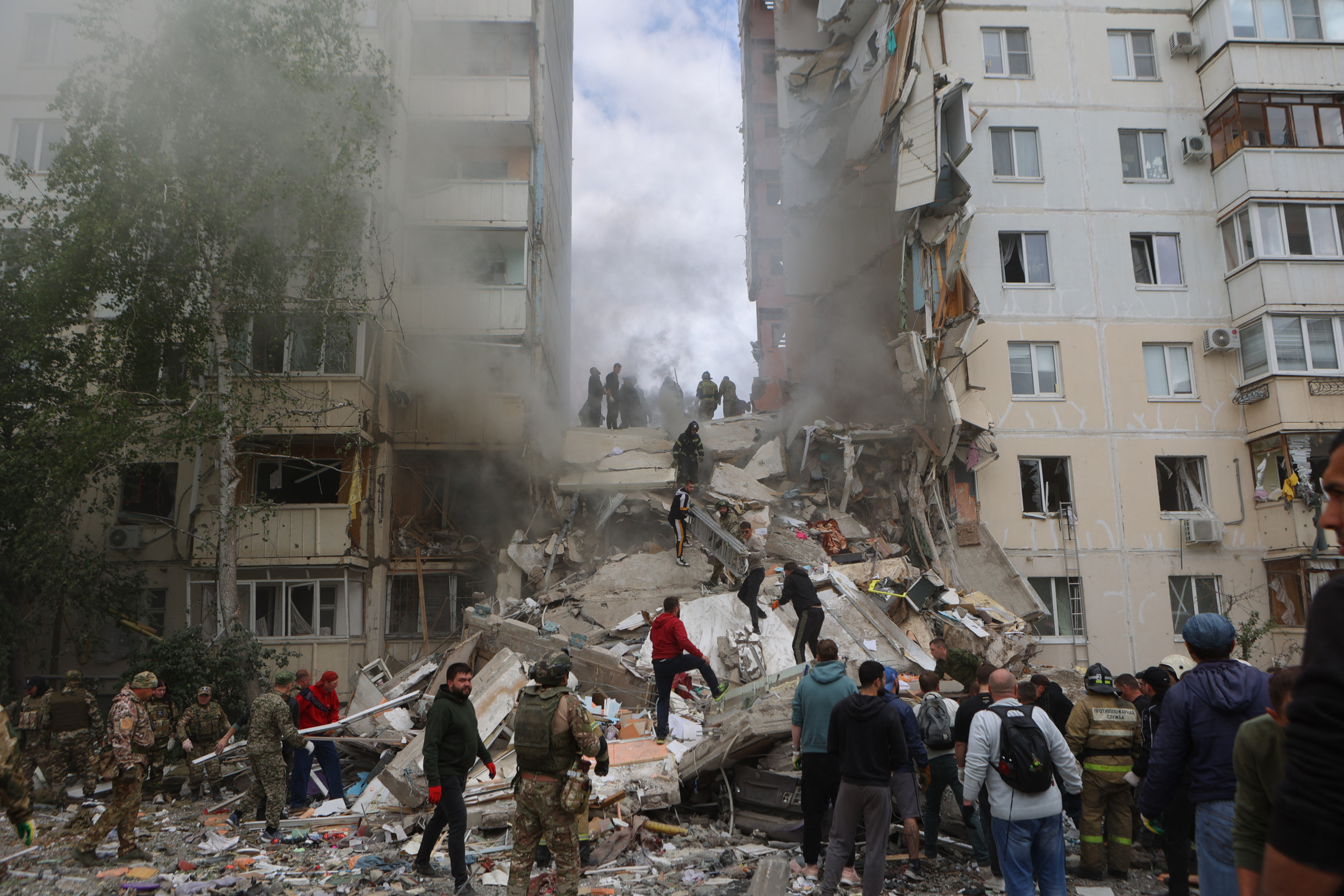In the six years since A Quiet Place lifted John Krasinski from the doldrums of “Jim From The Office” to “Jim From The Office Who Makes Mediocre Horror Movies,” the film industry made occasional attempts to replicate that simplistic, lightning-in-a-bottle, franchise-making success with other gimmicky post-apocalyptic monster movies. Netflix’s The Silence can be seen as an outright rip-off of Krasinski’s film, while indie Nicolas Cage vehicle Arcadian imagined a dystopia where the beasts are sensitive to light rather than sounds. 2024’s Elevation—directed by The Adjustment Bureau’s George Nolfi—has concocted a creature that forces human civilization to much higher ground.
Set in the Rocky Mountains of Colorado, it’s been three years since impenetrable heathens rose from underneath the earth and wiped out roughly 95% of the human race, herding humanity above “the line,” the cut-off elevation that the creatures, called “reapers,” will not climb above. It’s there in the peaceful, high-altitude wilderness that Will (Anthony Mackie) and his chronically ill young son Hunter (Danny Boyd Jr.) have fled alongside other survivors, a situation which under different circumstances would be seen positively as “touching grass.”
But not here, because despite the beautiful, crystal-clear sheen of landscape showcased through an assembly line of drone shots, Will makes the difficult decision to venture down to the abandoned world below in order to save the life of his son. The MacGuffin of John Glenn, Kenny Ryan, and Jacob Roman’s screenplay propels an unremarkable, trite narrative forward, shepherded along by noticeably poor special effects and cinematography straight out of a “Visit Colorado” ad space.
The majesty of nature is lost on the survivors of the monster-pocalypse and on Will, as the altitude is unhealthy for Hunter’s condition. The boy requires a machine to help him sleep every night—a machine that has, wouldn’t you know it, finally run low on filters. But Will is armed with a plan: make his way carefully down to a Boulder hospital, where he can acquire a new stockpile. Joining him are Nina (Morena Baccarin), a tough-as-nails ex-physicist who’s been quietly working on a solution to finally penetrate the reapers’ impermeable outer shell, and Katie (Maddie Hasson), best friend to Will’s late wife, who was killed by the creatures a year or so ago.
His wife’s death wasn’t just an accident, however. Nina used her and some of their other friends to test out a hypothetical she believed would destroy the reapers, actually killing most of the participants in the process. Nina has continued to trudge along in her quest to prove that the reapers can be killed, but Katie and Will harbor deep resentment towards Nina, which plays out between the three as they embark upon Will’s near-suicide mission. “Near-suicide” because the reapers don’t just have a tremendously tough and difficult-to-kill exterior, but are big, fast, and use red-bulbed tentacles to sense the carbon dioxide released from humans in order to track them—all they have to do is breathe, and they’re toast.
However, the design of the reapers is completely dull, reminiscent of a mutant ankylosaurus and emitting those same guttural, popping bug noises that seem like a stock soundboard for every modern horror movie monster. Additionally, the poorly lit setpieces allow for easy recognition that the CGI of the reapers is not quite up to snuff. Arcadian, by contrast, at least had a unique, unsettling creature design, and the filmmakers made the right decision to keep things largely silhouetted by darkness in order to hide flaws in the FX. But the reapers are Elevation’s least egregious special effects sin. Gunshots and muzzle flashes look straight out of a film school first-timer’s Adobe After Effects, and a green-screened ski-lift setpiece that features an artificial plunge from the chair renders Katie as an animated doll.
The reapers are also, crucially, only interested in killing human beings, and for no apparent reason other than the sport of it, something Nina has carefully observed. Thus, thriving wild horses roam free and unbothered in the new world that the trio discovers on their mission, leading the viewer to assume a possible environmentalist message of Elevation. This is not the case—revealed with clarity in the film’s climactic scene—as the film is very, very dumb. And not dumb in a fun way, because the tedious screenplay and Nolfi’s dry, withdrawn direction all take things gravely seriously. With Shelly Johnson as cinematographer, 90% of Elevation seems to shot via hovering drone—even more intimate shots feel like they’re being manned by a drone in how they all slowly stagger horizontally. It’s odd and impersonal, and produces a film that feels just as detached from its visual style as it does from its characters. All three leads are big bowls of nothing soup, each plucked from the Archetype Dictionary. “Dad who needs to save his son.” “Scruffy and loyal friend.” “Troubled foil who hides pain under snark.” “Dying son.” “Dead wife,” and so on and so forth.
None of the actors do much with the uninspired material, but perhaps Baccarin is the most enjoyable to watch as she grumbles in monotone about how she wants to kill herself and handily espouses monster factoids from her diligent research as a former Caltech professor. Anthony Mackie, assumedly the film’s greatest draw and a likable performer in his MCU outings, is a complete void of charisma, sleepwalking his way through the post-apocalypse as a Generic Action Protagonist (even though the film ends up totally in the hands of Nina).
Elevation stands tall as an attempt to capitalize on the past successes of A Quiet Place, if said A Quiet Place cash-in were removed of all the small yet crucial details that made the film in question a smash hit. At the very least, Elevation may compel travel-minded viewers to book a round-trip flight out to beautiful Colorado.
Director: George Nolfi
Writer: John Glenn, Kenny Ryan, Jacob Roman
Stars: Anthony Mackie, Morena Baccarin, Maddie Hasson, Tony Goldwyn
Release Date: November 8, 2024




















 English (US) ·
English (US) ·